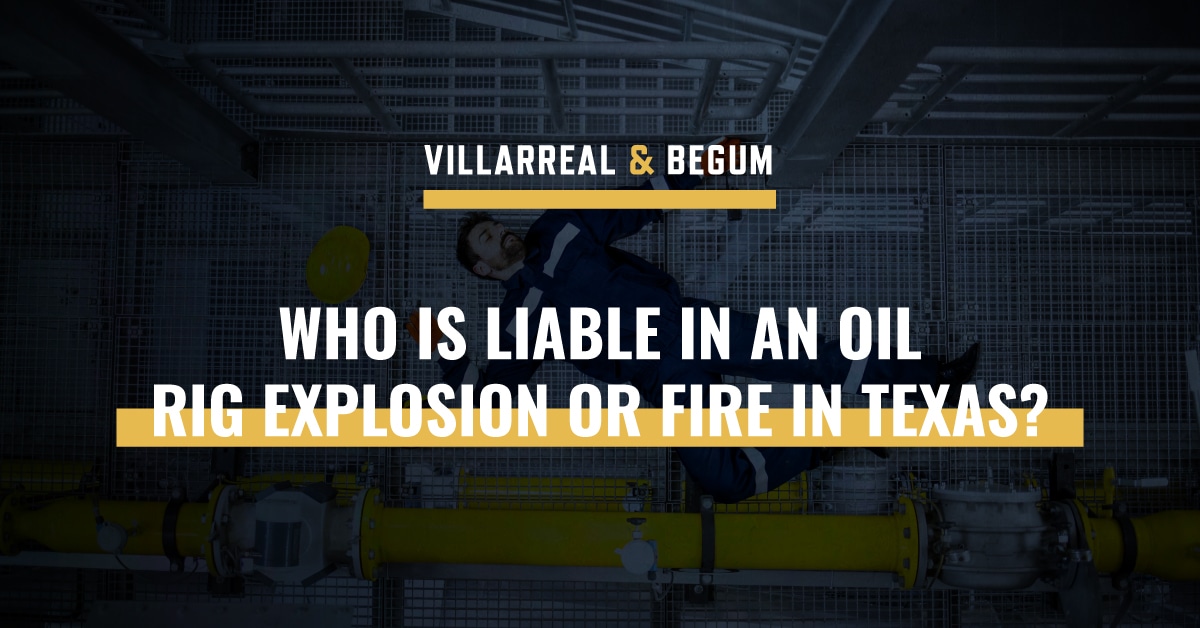
The oil industry plays a vital role in Texas, driving economic growth and providing employment opportunities for countless individuals. However, along with its undeniable benefits, this industry also carries significant risks. One such risk is the occurrence of oil rig explosions or fires, which can have devastating consequences for workers and the surrounding environment.
If you or your loved ones have been affected by an oil rig explosion or fire in Texas, it is crucial to seek legal guidance. Not only are the laws involving these accidents especially complicated, but oil companies can be quick to deny liability and have the financial and legal resources to fight an injury claim.
At the Texas Law Guns, Injury & Accident Lawyers, we aren’t intimidated by these huge corporations. Our dedicated personal injury lawyers have helped many injured workers get the financial recovery they need after a serious accident. It all starts with knowing how to establish liability.
Why are Oil Rigs So Dangerous for Workers?
The Occupational Safety and Health Administration (OSHA) reports that every year, more than 4,000 oil workers are injured each year and over 100 are killed. These statistics confirm that oil rigs present inherent dangers that make them particularly hazardous work environments.
Several factors contribute to the high risk associated with oil rig work.
- High-pressure and Flammable Substances: Oil rigs deal with high-pressure systems, such as drilling equipment and pipelines, which can lead to catastrophic accidents if not properly managed. Additionally, the presence of flammable substances like oil and gas increases the risk of fires and explosions that lead to oil rig deaths and injuries.
- Heavy Machinery and Equipment: Oil rigs rely on complex machinery and equipment, including drilling rigs, cranes, pumps, and heavy pipelines. The operation, maintenance, and movement of such equipment require specialized skills and careful adherence to safety protocols. Failure to do so can result in severe injuries or fatalities.
- Harsh Weather Conditions: Oil rigs are often located in offshore or remote areas, exposing workers to harsh weather conditions such as storms, high winds, and extreme temperatures. These conditions can compromise safety, making work more challenging and increasing the likelihood of accidents.
- Chemical and Toxic Exposure: Oil rig workers may encounter hazardous chemicals and toxins, including drilling fluids, solvents, and gasses. Exposure to these substances can lead to serious health complications, such as respiratory problems, chemical burns, or long-term illnesses.
The consequences of oil rig accidents can be devastating. Common oil rig injuries include burns, fractures, spinal cord injuries, or traumatic brain injuries. In worst-case scenarios, accidents can result in fatalities, leaving families grieving the loss of loved ones.
Laws Governing Oil Rig Explosions and Accidents
In Texas, oil rig operations are subject to a range of laws and regulations designed to promote safety and protect workers. The following are some key legal frameworks applicable to oil rig accidents:
- Occupational Safety and Health Administration (OSHA) Regulations: OSHA sets forth safety standards and regulations to ensure the well-being of workers in various industries, including the oil and gas sector. These regulations cover aspects such as hazard communication, personal protective equipment, emergency response, and process safety management.
- Texas Tort Law: Tort law governs civil wrongs, including personal injuries or property damage caused by negligence or wrongful acts. Under tort law, injured parties can seek compensation from liable parties for their losses.
- The Jones Act: The Jones Act, or the Merchant Marine Act of 1920, provides legal protection to maritime employees injured at sea. It allows injured seamen, including those working on offshore oil rigs, to sue their employers since they are not covered by workers’ compensation. The Deepwater Horizon case exemplifies how the Act can be applied in such situations.
- The Death on the High Seas: The Death on the High Seas Act (DOHSA) is a federal law that applies to wrongful death cases occurring beyond three nautical miles from the U.S. coastline. If the rig is within three nautical miles, state laws, such as the Texas Wrongful Death Act, would likely govern the wrongful death claim, potentially allowing for broader compensation options.
Who Pays Your Bills After an Oil Rig Accident?
If you have been injured in a Texas oil rig accident, determining who will pay for your medical bills depends on several factors, including the circumstances of the accident and the parties involved. Here are some potential sources for covering your medical expenses and lost income:
- Workers’ Compensation: If your employer carries Workers’ Compensation insurance, you may be eligible to receive medical benefits through this coverage. Workers’ compensation is a no-fault system designed to provide medical treatment and wage replacement to employees injured on the job. It typically covers medical expenses related to the injury, including doctor visits, hospitalization, medications, surgeries, and rehabilitation.
- Employer Liability: If your employer does not have workers’ compensation insurance, or if your oil rig injuries were caused by their negligence, you may have the right to seek compensation directly from them. In such cases, you may be able to file a personal injury lawsuit to recover your medical expenses as well as other damages resulting from the accident.
- Third-Party Liability: In some situations, the negligence of parties other than your employer may have contributed to the accident. For example, if a contractor, subcontractor, equipment manufacturer, or another third party acted negligently and caused your oil rig injuries, you may be able to pursue a personal injury claim against that party to seek compensation for your medical bills and other damages.
An experienced San Antonio oil drilling accident lawyer can assess the specific details of your case, identify liable parties, and determine the most appropriate legal course of action. They will work to protect your rights, gather evidence to support your claim, and pursue compensation on your behalf.
What Parties Are Potentially Liable in an Oil Rig Explosion or Fire?
If your employer doesn’t carry Workers’ Compensation insurance, you can still seek compensation by filing a personal injury lawsuit against the party or parties involved. Depending on what happened, the following individuals and companies may be to blame.
Oil Rig Operator
The operator is responsible for the overall management and supervision of the oil rig operations. They may own the rig or have a lease agreement with the rig owner. As such, their responsibilities include:
- Ensuring that the oil rig meets safety standards, is properly maintained, and complies with relevant regulations and industry practices.
- Exercising due diligence in selecting competent contractors and ensuring appropriate supervision during operations.
- Providing adequate training to employees and contractors to ensure they understand safety protocols and procedures.
Regarding potential liability, operators can be held accountable for their negligence or failure to fulfill their responsibilities. This includes inadequate maintenance, improper training, failure to enforce safety protocols, or negligently hiring contractors.
Contractors and Subcontractors
Contractors and subcontractors are engaged to perform specialized tasks on the oil rig, such as drilling, maintenance, or equipment installation. They have specific responsibilities, which may include:
- Carrying out their assigned tasks in accordance with recognized industry practices and standards.
- Following safety protocols established by the operator and relevant regulations. They should employ proper safety measures to prevent accidents.
- Ensuring that their workers are properly trained, qualified, and capable of performing their assigned tasks safely.
Contractors and subcontractors can be held liable for their negligence or failure to fulfill their responsibilities, including substandard workmanship, inadequate safety measures, or the use of unqualified personnel.
Manufacturers
Manufacturers play a crucial role in providing equipment, machinery, and components used on the oil rig. This includes items such as drilling rigs, pipelines, valves, and safety systems. Their responsibilities may include:
- Ensuring that their equipment is designed and manufactured to meet safety standards and perform reliably under expected operating conditions.
- Providing appropriate warnings and instructions for the safe use, maintenance, and inspection of their products.
Manufacturers can be held liable for defects in their products that contribute to an oil rig accident, such as faulty equipment, design flaws, or inadequate warnings.
Other Parties
Apart from the key parties mentioned above, subcontractors and service providers can also be held liable for their negligence or failure to fulfill their responsibilities. These parties may include maintenance or repair companies, inspection agencies, logistics providers, or any other entity involved in the oil rig’s operations.
Establishing Liability in an Oil Rig Explosion or Fire
In the aftermath of a drilling rig accident, establishing liability is essential for ensuring that you get the compensation you need for your medical treatment and financial stability.
It starts with a thorough investigation to identify any negligent actions or omissions that contributed to the incident. This includes gathering physical evidence from the accident site, reviewing documentation such as maintenance records and training logs, and obtaining witness statements. This evidence strengthens your case and provides support for establishing liability.
Expert witnesses can also play a vital role. These professionals have specialized knowledge and experience in areas such as engineering, safety protocols, or industry practices. They provide technical analysis, assess the standard of care, and determine causation, lending their expertise to the establishment of liability.
An experienced Texas oil rig accident lawyer can guide you through the process of establishing liability after a drilling rig accident. They understand the nuances of such cases and can provide you with personalized legal advice and representation. An oil rig accident lawyer will advocate for your rights, assist in gathering evidence, engage expert witnesses on your behalf, and navigate the legal process with your best interests in mind.
Remember, you don’t have to face the challenges alone. Reach out to an oil rig accident lawyer today to ensure your rights are protected and you have the best chance of getting the settlement or verdict you need.
Get a Free Consultation With an Oil Rig Accident Attorney
Understanding liability in the event of an oil rig explosion or fire is essential for seeking compensation and preventing future accidents. If you or your loved ones have been affected by an oil rig accident in Texas, it is crucial to consult with a knowledgeable legal team.
At the Texas Law Guns, Injury & Accident Lawyers, we handle a wide range of personal injury cases, including oil rig accidents. We understand the laws that cover these injuries and have the experience and resources to build a strong and compelling case. To get your claim started, contact us today for a free consultation. We have offices in San Antonio, Austin, Laredo, and McAllen to serve you better.
See also:
What are the Most Common Injuries for Texas Oil Rig Workers?
San Antonio Plant and Refinery Accident Lawyers
San Antonio Plant and Refinery Explosions Lawyers
Filing a Lawsuit After an Oil Field or Offshore Accident

Alexander Begum has tried over 50 trials to verdict and tried or settled over $500 million in cases. Alex is a founding shareholder of the Texas Law Gun, Injury and Accident Lawyers.



